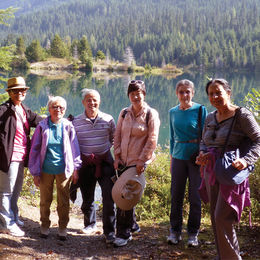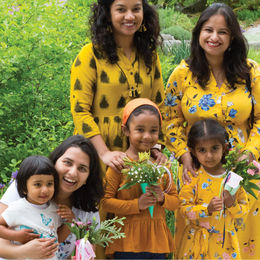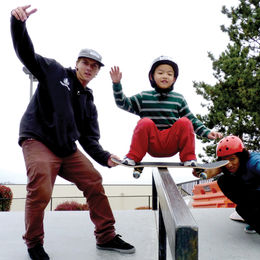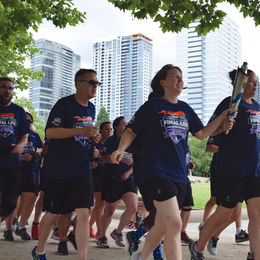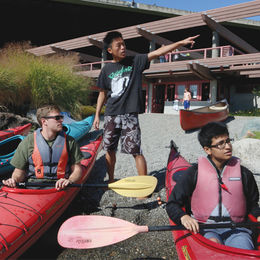
Goal I
Ensure that every Bellevue resident can access recreational opportunities and community services.
Strategy A
Evaluate and improve department programs, systems, and resources to ensure that recreational programs and community services are diverse, equitable, and accessible in development and delivery.
Actions:
- Identify barriers to participation and prioritize their removal.
- Increase data collection and analysis to better understand our current and potential customer base, service gaps, and programmatic needs, with a specific focus on the needs of underrepresented populations.
- Increase collection of demographic data to inform program design and development.
- Design programs and services whose timing, content, language, and format are culturally relevant and accessible for communities represented in Bellevue.
- Provide multiple methods to promote and provide equitable access to program information, including online, hard copy, smartphone, telephone, and in-person opportunities. Ensure that information-sharing and registration methods are as simple as possible and keep pace with technology and user trends.
- Update the online registration system to allow financial assistance applicants to register before their application is processed.
- Develop evaluation standards and training materials for city and contracted programs and services to ensure that practices are accessible, equitable, and inclusive.
- Working with the Diversity Advantage Team, provide diversity, equity, and inclusion education and training to all staff.
- Offer virtual programming opportunities to enhance accessibility based upon program type and customer interest.
- Continue to provide and regularly evaluate additional options for free or low-cost programs.
Strategy B
Connect with new audiences through expanded outreach and communication efforts.
Actions:
- Develop an outreach approach to connect with communities with a need for program opportunities. Work closely with trusted community leaders, community center staff, advisory groups, and other city employees or volunteers who communicate regularly with residents.
- Ensure compliance with language access requirements in Title VI of the Civil Rights Act by translating program information, forms, and registration materials to languages represented in Bellevue where documents are deemed vital or a request is made. Continue to increase equitable access by incrementally translating additional items.
- Improve messaging around the department’s financial assistance program to more clearly communicate that it exists to provide financial assistance to people of all ages.
- Adapt marketing and social media communications to include channels and content that are relevant to individuals who are currently not adequately served by the department.
- Explore using diverse, equitable, and culturally responsive communication media in addition to standard printed or online materials; for example, TV, radio, newspaper, and in-person presentations.
- As recommended by the Diversity Strategic Plan, identify best practices, and develop and implement procedures to recruit recreation staff and select contractors whose demographics reflect the community.
- Share information about programs and services with other departments, boards, commissions, and City Council to raise awareness about department offerings.
Goal II
Offer programs and services that are consistent with our guiding principles and reflect the community’s interests and needs, specifically those of underrepresented groups.
Strategy A
Identify and address gaps in program and service delivery in collaboration with community members and organizations.
Actions:
- Conduct systematic, department-wide evaluation of programs and regular community assessments to identify gaps and receive community feedback on current programs.
- Compare the department’s full suite of program offerings, and offerings from other providers, to current needs and trends to ensure balanced, relevant, and culturally responsive programming system-wide.
- Use information gathered from the Human Services Needs Update and knowledge from the Human Services Division to inform planning for recreation and community services.
Strategy B
Empower staff to respond nimbly to the changing recreational needs of a growing city.
Actions:
- Define and reinforce an organizational culture that is committed to the equitable and accessible delivery of programs and services.
- In collaboration with other city departments, develop and deliver a comprehensive onboarding program for staff at all levels of the department and for both full time and partially benefitted employees, as recommended in the Diversity Strategic Plan.
- Develop and implement customer service standards and training for the Recreation Division.
Strategy C
Engage with new and established partners to enhance program and service delivery.
Actions:
- Create a living database of recreation providers and partner organizations that is kept up-to-date and accessible for all staff.
- Enhance the city’s partnership with other educational providers and non-profit organizations to collectively address program and service gaps and increase capacity.
- Enhance the city’s partnership with the Bellevue School District to communicate about program opportunities and to maximize programming options and facility resources for residents.
Goal III
Promote community well-being through programs and services that instill a sense of belonging and inclusion.
Strategy A
To better connect residents to the community, expand program choice for those who would otherwise have limited opportunities for recreation.
Actions:
- Distribute programming geographically to improve access and reflect demographic trends, in partnership with community organizations and entities.
- Advocate and encourage the expansion of accessible physical access to programming locations via mass transit and active transportation means in collaboration with other city departments, such as Transportation.
- Design and adapt accessible facilities that foster intergenerational participation, unstructured play, and informal gathering opportunities.
- Further implement the goals and strategies outlined in the department’s Choices for People with Disabilities plan to promote both adaptive recreation opportunities and inclusion services throughout the system.
- Increase the use of language access tools and services in program offerings, and explore additional communication technology that is user-friendly, efficient, and provides access.
- Provide public information indicating the availability of accessible and culturally responsive programs and services.
Strategy B
Promote recreation, gathering places, special events, and time to connect as important facets of a livable community and healthy economy.
Actions:
- Continue to take an active role in facilitating and producing community events.
- Continue to engage volunteers to advance our mission and vision and encourage a sense of community contribution and civic engagement.
- Incorporate intergenerational and multicultural activities into program development.
Goal IV
Foster individual health and wellness through opportunities for structured and unstructured play, exercise, and recreation.
Strategy A
Provide resources and programs that promote lifelong fitness and healthy lifestyles.
Actions:
- Provide programs focused on nutrition, fitness, and healthy lifestyle choices for individuals at a variety of income levels.
- Ensure that staff can access and share information about human services resources available in the community.
- Establish standards for city-run fitness classes to ensure that they are consistently of high value and meeting community needs.
- Collaborate with other service providers to promote and/or offer continuing education opportunities for older adults to support cognitive health.
- Continue to provide healthy food choices in vending machines and, where applicable, encourage healthy food choices in programs.
Strategy B
Develop programs and tools that get people outside and encourage exploration of parks and trails.
Actions:
- Promote and expand the breadth of programs offered in parks, with the goal of welcoming new participants and inspiring a sense of wonder about our natural environment.
- Learn more about historical and lived experiences and current perceptions that Bellevue’s communities have about the outdoors through listening and outreach, and target programming to reduce any barriers that may exist.
- Improve park signage using universal design and language access principles to enhance access to park rules, wayfinding, and general park information.
- Install interpretative and informational signage that is culturally responsive and reflects the full history of the region.
- Expand the department’s use of tools and programs, including digital resources, to promote engagement with parks and programs.
- Increase coordination among the Park Ranger Program, community centers, and educational providers to expand environmental education and service-learning opportunities.
Strategy C
Design programs and facilities that provide opportunities for play for, and between, residents of all ages.
Actions:
- Continue to engage the principles of universal design to develop and renovate parks and facilities so that they are adaptable and accessible for all ages and abilities.
- During new development or planned renovation, design facilities to be as flexible as possible to accommodate future changes in recreation trends.
- Continue to integrate creative play opportunities for all age groups into the design and development of parks and facilities.
Strategy D
Provide recreation programs and community services that support children, youth, and teens in the development of physical, cognitive, and social skills; leadership experience; expanded learning opportunities; and risk reduction.
Actions:
- In partnership with educational and social service providers, identify how programs can support expanded learning opportunities.
- Working with community organizations, continue to build and strengthen citywide collaborations to increase program access and improve overall outcomes for youth.
- Reference the Washington State Quality Standards for Afterschool and Youth Development Programs in developing both city and contracted youth programs and services.
